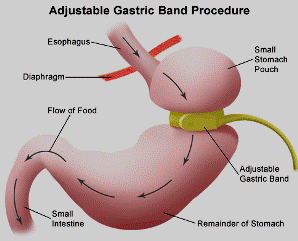 According to the preliminary results by physician-scientists from Morgan Stanley Children’s Hospital of NewYork-Presbyterian and Columbia University Medical Center, teenagers’ obesity-related medical complications improve just six months after laparoscopic gastric banding surgery.
According to the preliminary results by physician-scientists from Morgan Stanley Children’s Hospital of NewYork-Presbyterian and Columbia University Medical Center, teenagers’ obesity-related medical complications improve just six months after laparoscopic gastric banding surgery.
The study reports that the small group of extremely obese teenagers who received the minimally invasive surgery, also called the Lap-Band procedure, as part of a clinical trial lost an average of 20 pounds after six months and had significant improvements in abdominal fat, triglyceride measurements and blood sugar levels as measured by hemoglobin A1c — all risk factors for diabetes and heart disease.
The patients’ liver function and a measure of immune response also improved, according to the abstract.
“Extremely obese teenagers have obesity-related health problems, particularly diabetes and increased cardiovascular risk.
Laparoscopic gastric banding, which has been shown to be a safe and effective way to lose weight, now offers the possibility of reducing obesity’s medical complications,” says lead author Dr. Ilene Fennoy, a pediatric endocrinologist at Morgan Stanley Children’s Hospital of NewYork-Presbyterian and clinical professor of pediatrics at the Columbia University College of Physicians and Surgeons.
“Until recently, these patients have had to rely primarily on non-surgical methods or higher-risk surgeries to lose weight, and few of these treatments have succeeded in achieving major weight loss or greatly improving their overall health.”
For more information, visit: ScienceDaily











